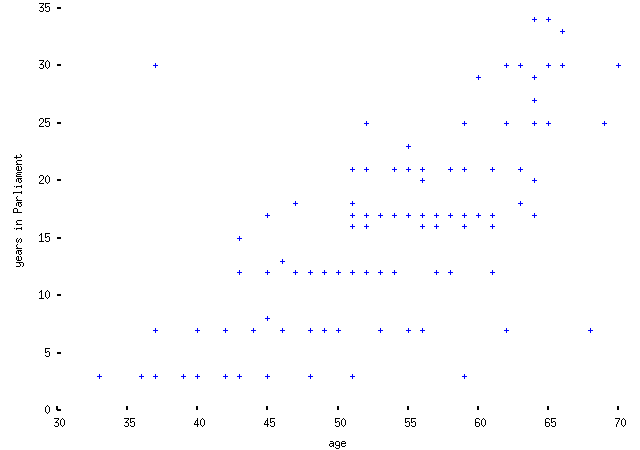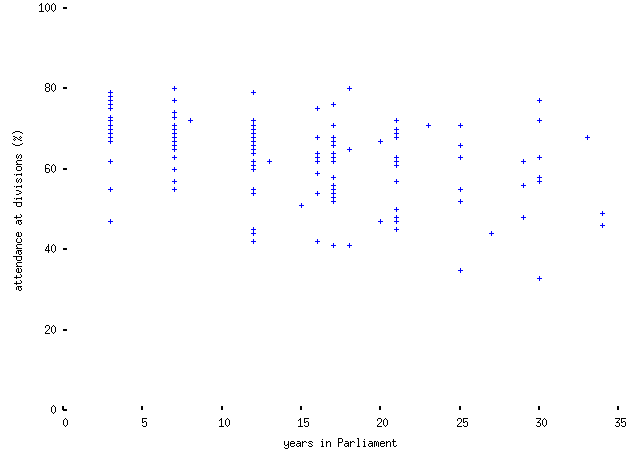Both Anthony and Francis argued, in reference to my comments on Tory `bed blockers' and claims made about them that, rather than analysing the data in terms of the age of the individual MPs, I should have used the length of their service in Parliament. In fact, this was what I was originally intending to do, but I couldn't find a good reference which collated the lengths of service of the various MPs; I assumed that their age would be a reasonable proxy. Since I wrote that, Anthony has very kindly complied with my suggestion and provided me with a table of the relevant data, for which gift many thanks are due.
It turns out that (as you'd expect), age and length of service of Tory MPs are pretty well-correlated: (this and later plots ignore various special cases -- speakers, ill MPs and outliers)
but treating the data in terms of length of service does change the results slightly. While there are no significant correlations between MP ages and their performance on the indicators for which I have data, there are with length of service. In particular, both the number of written questions asked and attendance at divisions are inversely correlated with length of service -- that is, MPs who've been in the Commons longer ask fewer questions and vote less often:
(Slightly surprisingly, although the plot -- not shown -- looks convincing, it turns out that there's no significant variation of Fax Your MP response rate with length of service.)
There's not a whole lot to say about this, really. It makes the Torygraph's story a little more plausible, though I'd be cautious about broad-brush use of these indicators. Anthony suggested in email that I see whether it makes any difference whether an MP has served several disconnected stretches or one continuous term; from what I've looked at, it doesn't. If you want a causal theory to inform these vague statistical stumblings, it would be as well to start with the theory (expounded, I think, in Yes, Minister, though I can't find the quote at the moment) that a typical government consists of three-hundred-and-fifty-odd MPs. About a hundred will be too old to be Ministers; about a hundred will be too young; this leaves about a hundred and fifty to fill about a hundred Ministerial posts.
Some of these will be too useless for the job, leaving the government with rather little choice in matters. As MPs age, they risk passing from `eligible' to `elderly', or fucking up badly enough that they become `useless'. (In Matthew Parris's autobiography, he recalls being called to one side by a whip and told that, had he not forgotten to vote in an important division, he would probably have achieved office of some sort; as it was, he was left to languish on the back benches....) As MPs carry on through their Parliamentary careers, with the prospect of high office receding, the incentives to attend divisions, speak and hope to be noticed, and ask endless written questions with the hope of uncovering hidden Governmental scandal must recede with it.
Which is a plausible enough theory if you like that sort of thing. I'm sure if the correlation had come out the other way -- it's hardly striking, after all -- I could have come up with something equally plausible-sounding about the loyalty and work ethic of the long-serving, or some other such nonsense.


